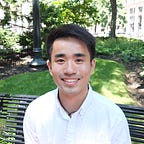The Power of Introspection
This past month has been full of introspection. Transitioning from college to post-grad life, reviewing drafts of my younger brother’s college application essays, and the moment of reflection that another new year seems to always inspire. Merriam-Webster defines introspection as:
a reflective looking-inward; an examination of one’s thoughts and feelings
We live in a world where there’s plenty of pressure to look outward for the sake of comparisons or for the thrill of chasing the next thing. Taking regular pauses to look inward has given me both strength and direction in different ways, and I’d like to share a few stories from my life where introspection has led to some insightful conclusions.
Discovering Direction
One of the most influential pieces of writing I did as an undergraduate was an assignment in Ruth Starkman’s Rhetoric of Science, Technology & Democracy course. We were asked to propose a quarter-long topic to pursue for the duration of the 10-week quarter, and I spent a weekend brainstorming different topics to write about. At the time, I was at a crossroads of sorts between an existing interest in healthcare as a premedical student and a budding interest in technology and computer science. In my moment of introspection, I tried to identify what attracted me to both fields of study. To me, healthcare offered an incomparable opportunity to impact the lives of others by improving and caring for their very livelihoods. On the other hand, Computer Science had a dizzying range of applications and the potential to scale one’s individual impact to so many more people.
I found myself attracted to an intersection of healthcare and technology that I had very little exposure to, but the proposal I wrote in response to that assignment formed the basis of my academic, and now professional aspirations. Taking a moment to look inward and examine why I was attracted to two seemingly disjoint trajectories allowed me to discover an entirely new direction that informed a large part of my undergraduate ambitions.
A Non-scientific Method
As I was preparing my own college application essays, one particular essay prompt from UChicago inspired a great deal of self-examination:
What is your non-scientific method?
As a student of an intensive Math/CS/Science magnet program, I was surrounded by methodical and research-based thinking. However, I also spent significant time with music as a classical pianist and violinist. The easiest essay response that first came to mind was a technical analysis on how I approached learning and practicing music. The topic didn’t feel quite right though — I was searching for something more visceral that better represented these two personalities. I decided to spend time examining patterns for thinking both in and out of science.
This train of thought eventually evolved into an idea that remains as one of the most creative (and least practical) ideas I’ve ever imagined: a musical model explaining organic chemistry with music theory. Realizing that I might have peaked, I tried to formalize my quickly fading burst of creativity in what may be the flimsiest application for chemical education to the Journal of Chemical Education. I ended up receiving the highest rating for “Novelty” and the lowest rating for “Pedagogy”. Two years later, I finally put the idea to rest by repurposing it as a paper in college.
As impractical as this whole thought experiment might have turned out to be, it remains a cornerstone of experiences I’ve had worked at the intersection of different ideas or fields. Looking back, it’s clear that this seemingly spontaneous idea was really an artifact of a much more gradual journey of self-examination.
Vocational Wayfinding
In my current limbo between graduating from school and starting my first job, I’ve been thinking a lot about how my current set of skills/experiences intersect with the impact I want to have on the world. A little under two years ago, I drafted a set of explorational odysseys as a capstone project to Bill Burnett and Dave Evans’ popular Designing Your Life course (we were tasked in creating 3 starkly different 5-year timelines with varying degrees of risk). Looking back, I find myself following the “industry” timeline where a traditional PM rotational program has been substituted by a 6-month stint as an APM and the entry-level product position that I’m headed into.
This exercise in introspection reminds me of themes that still ring true for me. I’m still very much interested in early-stage companies, and the challenges that come with refining or finding product-market fit. I’m also still interested in writing/creating music (though more-so as a producer now than as an artist). But more importantly, taking time to complete that exercise has allowed me to understand how and where I’ve grown. I can see how much I’ve grown in the short time I’ve spent working in startups and within healthcare in particular and how my aspirations have changed around music. The trajectory I can plot from an earlier point of reference not only informs me of how I’ve changed since then, but also empowers me with the power and context to influence that direction and trajectory from here on out.
Taking regular pauses understand and articulate why I approach problems, topics, and life in different (or similar) ways have helped me embark on entirely unexplored areas of personal growth. My hope is that sharing these stories help remind me to continue doing the same and inspire others to regularly take time for introspection as well.
